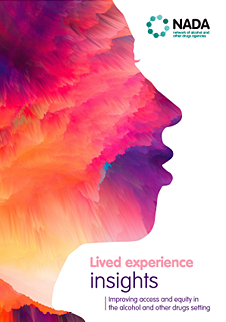 This resource enhances the capability of non-government AOD services to make services more accessible and equitable for people who seek out AOD support. This is the second edition of a guide that was originally developed by NADA in consultation with other organisations. NADA has revised the first edition of the guide to reflect factors such as: changing language, needs and challenges faced by diverse populations in accessing AOD services.
This resource enhances the capability of non-government AOD services to make services more accessible and equitable for people who seek out AOD support. This is the second edition of a guide that was originally developed by NADA in consultation with other organisations. NADA has revised the first edition of the guide to reflect factors such as: changing language, needs and challenges faced by diverse populations in accessing AOD services.
This resource provides principles and examples of best practice approaches to working with diverse communities. It sets out ways in which AOD services can be more accessible and equitable in their work with the diversity of people that access NSW services.
Download this resource [PDF]
What’s in this resource?
The resource provides best practice approaches and principles for working with the following populations:
- Aboriginal and Torres Strait Islander communities
- culturally and linguistically diverse communities
- gender and sexuality diverse people
- older people
- people with disabilities.
Complementary resource
Lived experienced insights: improving access and equity in the alcohol and other drugs sector
 This resource complements the guide Access and equity: Working with diversity in the alcohol and other drugs settings – second edition
This resource complements the guide Access and equity: Working with diversity in the alcohol and other drugs settings – second edition
In it, people with living and/or lived experience of accessing AOD services discuss how to improve access and equity to AOD services. Interviewees came from the following communities:
- Aboriginal communities
- Older people
- Sexuality diverse people
- People with disabilities
- Culturally and linguistically diverse communities
Interviewees explored barriers they faced in engaging with treatment as it related to their experiences and identities, and shared practical tips for AOD services to address barriers to treatment.
Download this resource [PDF]
Access and equity: Working with diversity in the alcohol and other drugs settings—second edition, with contributors (AUSLAN interpreted)
How can AOD services become more inclusive for older people, Aboriginal communities, sexuality diverse people, and culturally and linguistically diverse communities? Panellists with lived experience of accessing AOD services from these communities responded to two important questions in this webinar. Firstly, they responded to the query: ‘what are the barriers to AOD treatment for your community/ies?’. Secondly, they responded to the question: ‘what supports can AOD services provide to assist you and your community/ies in the AOD treatment journey?’.
Panellists included:
- Gail, a Gumbaynggirr and Wiradjuri woman and caseworker
- Basem, who brought a queer, Middle Eastern perspective to AOD accessibility
- Kevin, an advocate who spoke about improving inclusivity for older people
- Ahmad, an advocate who discussed improving inclusivity for culturally and linguistically diverse communities.
The session was hosted by NADA’s Project Coordinator Hannah Gillard, and was AUSLAN interpreted by Lizzi Price. We apologise that due to tech issues, the visuals of the speakers didn’t show up alongside the AUSLAN interpreter Lizzi, who is spotlighted in this webinar for accessibility purposes.
Related resources and videos











